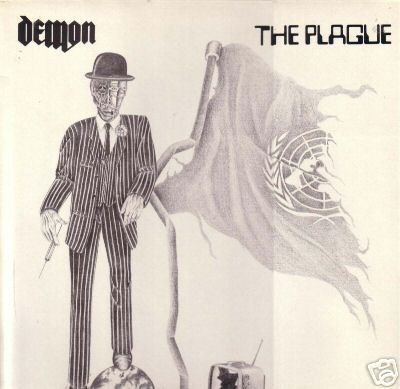No Need to Beware This Plague - 94%
It’s 1983 and heavy metal is still a commercially flourishing genre in the UK. Is it any wonder why Demon’s record label decided to drop them, discovering their band with the most Satanic and threatening name intended to enter progressive rock? Well, it certainly might have rung like a stupid idea at the time, but in retrospect this prog/hard rock album is one of Demon’s masterpieces.
Demon developed a unique sound for this release, sounding futuristically urban. The drums are hollow and echoing electronic booms, the guitars are digital streams of technological particles, and the only component that remains the same is Dave Hill’s distinct working man’s voice as he sings like an archaic human stranded in a dystopian world. After all, “1984” is just around the corner.
I don’t know what sort of apparently computerized effects Demon utilized to acquire this sonic idiosyncrasy: a television broadcast from a year down Father Time’s stream, but it is certainly impressive and succeeds in appearing minimally synthetic. From the opening title track the listener is introduced to the beeps, buzzes, and static that pulls him or her into the societal hell. There remains a glimmer of hope in the optimistic melodies of this song, but the mood is cautious toward Big Brother because George Orwell’s bad dream is coming disturbing close to reality.
When the first song completes, proving itself a powerful composition despite its simple harmonized chorus of “The Plague!”, a number called “Nowhere to Run” takes count. With techno-esque loops of flying saucer-resonating lights all flashing, a tune perhaps worthy of a dance at the local club on a cyber-themed evening, it is understood that this concept piece is built to be more than a revelation of impending self-damnation and doom, but a warning about the necessity to wallow in the joy of humanity and not let ourselves fall victim to dangerous albeit useful preoccupations: government, science, and vanity.
This song follows a similar pattern to the preceding, like its successors, all being mid-paced tunes or ballads gifted with strong writing and introspective bridges. “Blackheath- Part One” and “Blackheath- Part Two” differ slightly, existing as two halves linked to make a more catchy, chorus-oriented work. More commercial and radio-friendly, any attempts at making it too congenial with the airwaves are stunted by the division between them; it does add to the complex nature, though.
Still, despite certain complexities a bulk of this is relatively straightforward for the genre. “The Writing’s On the Wall” is probably the best example of complicated organization, constructing a crescendo into some amazing sections. The appeal of raw emotion fails to be neglected in addition, with the following “A Step To Far” relying primarily on Dave Hill crying “I Can’t Come Down!” Demon often pen perfect poetry, but even when they go elementary the talented vocalist delivers with enough fervor to create the illusion of lyrical brilliance.
The minor flaw of this album is that the melodies are less intoxicating than what Demon are capable of and thus it is in a way less memorable than most of their doings.
I prefer the next concept album, “British Standard Approved”, to this one due to more intriguing subject matter and the former’s more compelling environment of tension, but “The Plague” is certainly a listen to invest in.

The Plague - difficult to cure? - 80%
I am convinced that this album and Rainbow’s Difficult to Cure are twins. They were separated at birth and 20 years later they are different, but share a connection. This was Demon’s attempt to go into mainstream. It didn’t work well for them, although I could’ve sworn that I heard some of these songs in an '80s zombie movie. Some of these tracks are made for radio of the times, yet others are genuinely unique and brilliant. Demon have a vocalist with a powerful voice that fits the music. The guitars are solid except that they could have used more distortion.
There is no metal on this album...nada, zip, zero. Instead there are some really weird and artistic tracks such as “Fever in the City” and “The Only Sane Man”. Both are piano-driven acoustic numbers. The instruments are barely audible at times, yet the music is depressing and memorable. Impending doom. The end of the world. Only wasteland remains. The powerful vocals and the minimal instruments are atmospheric. When the instruments are highlighted in the climax of the songs, it is a flash of lightning that illuminates the horror. These two songs must be heard, for they are some of the best ballads “metal” has to offer.
“The Plague”, “Nowhere to Run” and “The Writings on the Wall” are enjoyable '80s rock numbers. There is no filler on this album. This album is situational listening – it has the slowest pace of any album I own. If you can deal with that and had enjoyed '80s Rainbow releases, this will not disappoint.

